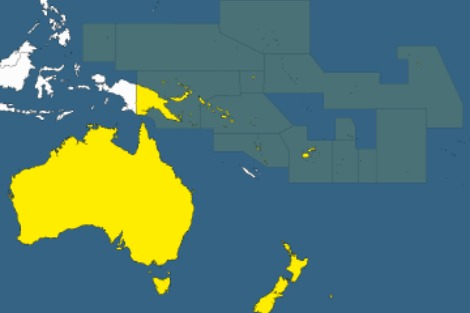by Lealaiauloto Aigaletaule’ale’a Tauafiafi
 |
| Green party MP Jan Logie. CREDIT: REBECCA THOMSON/stuff.co.nz |
:
Added to that was Pacific islands spokesperson for the Green Party, Ms Jan Logie calling for Australia and New Zealand to put the interests of the whole Pacific ahead of their domestic interests – and not “bully” their smaller island neighbours.
The proposed P.A.C.E.R. Plus agreement aims for greater regional trade integration between Pacific countries and Australia and New Zealand. It is seen as the way to create jobs, drive private sector growth, raise standards of living and improve the Pacific region’s economic development so that it is self-sustaining.
But last week, Fonotoe Pierre Lauofo, Samoa’s Minister for Trade, and Deputy Prime Minister told media that Samoa is not happy with the way things are going. He wants current barriers on trade to come down more quickly.
 |
| Samoa Deputy P.M: Fonotoe Pierre Lauofo. |
Specifically he is referring to one of the four priority areas in the proposed P.A.C.E.R. Plus agreement, that of ‘regional labour mobility’. The other three priority areas being: rules of origin, development assistance, and trade facilitation.
Fonotoe wants the current regional seasonal employment scheme (R.S.E.) between New Zealand and Samoa, to also include traineeships and working holiday programmes.
“That’s a bit of the contentious issue from the New Zealand perspective, and Australia, because Australia is also part of P.A.C.E.R. Plus. So those are the issues we are looking at resolving as soon as possible so that could better access the markets in New Zealand and Australia.”
While Ms Logie this week told the New Zealand Pacific, “P.A.C.E.R. Plus is supposed to be a development agreement rather than a free trade agreement but up until now no progress has been made on development assistance. Australia and New Zealand have been saying they’ll deal with funding separately. It’s hard to see how that’s in the best interest of the Pacific.”
She added that latest figures out of the Asian Development Bank “highlight again the need for additional development support for the Pacific to adapt to climate change. New Zealand shamefully took that money out of the existing aid budget. This track record doesn’t bode well for the P.A.C.E.R. Plus.”
“New Zealand has already made a significant investment in negotiating this agreement, we need to make sure that it’s not just another attempt to bully our smaller neighbours.”
Ms Logie’s comments hit at the heart of the matter in this third N.S.A. meeting. In last year’s N.S.A. meeting in Brisbane, there was a fall-out. And it pointed to the lack of funding assistance by Australia and New Zealand to get Pacific N.S.As to provide critical input.
A number of N.S.As leveled heavy criticism about the lack of meaningful discussions and participation by non government organisations. Only one non-government organization was in attendance at the 2012 meeting, Mr Adam Wolfenden, Campaigner for Pacific Network around the region on Globalisation (P.A.N.G.) told the Vanuatu Times back in April 2012.
“The lack of funding available for key groups and no discussion of substantive issues has resulted in a consultation that has lacked critical input,” said Mr Wolfenden.
The key issues that need to be resolved according to him are “adequate funding for effective participation and real discussion about the substantive issues at regional consultations as well as adequate funding and capacity for national consultations.” The concern amongst private sector organisations was the “inability of the diverse voices of non-state actors to be present”.
Added to Mr Wolfenden’s comments were those made by the Australian Fair Trade and Investment Network (A.F.T.I.N.E.T.). They commented that it is time for Australia to provide the money necessary for the Pacific to hear from N.G.Os. “Whilst we appreciate and welcome Australia’s provision of some funding for the N.S.A. dialogue, this consultation is an example of a job half-done,” Harvey Purse, Trade Justice Campaigner of A.F.T.I.N.E.T. told the Vanuatu Times.
“Australia has always acknowledged the constraints in the region including limited funding for consultations and the involvement of N.S.As. “However, the funding provided by Australia and New Zealand is inadequate. So we've now had a consultation that is not representative of the wide spectrum of views in the Pacific, and failed to include any critical voices. “It can hardly be seen as improving the lives of Pacific peoples when the non government sector, with their diverse expertise and views, have less representation at these key consultations than multi-national corporate interests such as big tobacco (B.A.T.), alcohol (Heineken) and finance (A.N.Z.).”
The Vanuatu report noted that Pacific Island business was well represented with the regional body the Pacific Islands Private Sector Organisations (P.I.P.S.O.), several business councils and Chambers of Commerce present. However, largely absent were small and medium enterprises mainly owned by Pacific islanders.
According to the draft agenda of the Auckland meeting this Friday, P.I.P.S.O. will present and discuss the views of their Membership with regard to the nature and depth of consultation desired during P.A.C.E.R. Plus negotiations. They will discuss best practice, and provide examples of ways to strengthen consultations and make them more effective.
The stated main objective of the 2013 meeting is about finding ways for better consultation between N.S.As and national governments in the P.A.C.E.R. Plus process. And to also look at their respective roles in implementing P.A.C.E.R. Plus when it comes into force.
Criticism from 2012 was seen as the litmus test for the 2013 meeting. Will there be more than one N.G.O. in attendance? How much funding was made available for Pacific N.S.A.s to attend? Have there been funding made available for national consultations leading up to these regional meetings?
On the bigger picture, what is P.A.C.E.R. Plus? Who said it is important to the Pacific, and why?
The answer is found at the highest level. In 2009, Pacific Trade Ministers from 13 Pacific countries agreed in Apia, Samoa to negotiate P.A.C.E.R. Plus because they saw the need for a much stronger regional trade integration with Pacific super powers Australia and New Zealand. They felt that by having a trade agreement such as P.A.C.E.R. Plus, it will give them a formalized framework that will benefit each Pacific country through the creation of jobs, drive private sector growth, raise standards of living and improve the region’s sustainable economic development.
Meantime for it to work for each country at different stages of economic development, the structure of P.A.C.E.R. Plus should be flexible enough to allow countries ready to move ahead with negotiations, to do so, while countries who are not, are given more time to prepare.
And to make sure that the voices of all countries are heard, that a true assessment of their different stages of development are accounted for, it is important that a wide and diverse voice from N.S.A.'s is heard.
The process therefore, promotes gradual regional integration in a way that supports the economic development of the 13 party members while taking into account their differences.
Even though the coverage and framework of P.A.C.E.R. Plus have yet to be agreed upon, the priority areas for negotiations have been identified.
In October 2009, in Apia, Samoa, Forum Trade Ministers agreed on the common priority issues:
- Rules of Origin
- Regional Labour Mobility (beyond Mode 4)
- Development Assistance, focusing on physical infrastructure for trade, trade development and promotion; and
- Trade Facilitation, including Sanitary and Phytosanitary (S.P.S.) Measures,
- Technical Barriers to Trade (T.B.T.), Standards and Customs Procedures.
And in 2010, Forum Trade Ministers Meeting also noted ‘the fundamental importance of shipping, aviation, telecommunications and water infrastructure to increase trade in goods and services between Member Countries’, and agreed that these were priority negotiating issues for P.A.C.E.R. Plus.
INFORMATION: NON STATE ACTORS (N.S.A.'s)
According to Article 6 of the Cotonou Agreement, non-state actors include:
- Civil society in all its diversity, according to national characteristics;
- Economic and social partners, including trade union organisations and;
- The private sector.
Also included in this definition are informal groups such as grassroots organizations, informal private sector associations, etc. The private sector, however, is considered only insofar as it is involved in non-profit activities (such as private sector associations, chambers of commerce, and the like).


 Jemma
Williams has an honours degree in international studies specialising
in international development. She currently works for the Australian
Fair Trade and Investment Network.
Jemma
Williams has an honours degree in international studies specialising
in international development. She currently works for the Australian
Fair Trade and Investment Network.















